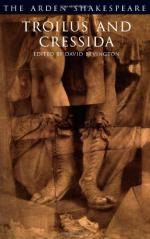|
This section contains 11,045 words (approx. 37 pages at 300 words per page) |

|
SOURCE: “‘Rule in Unity’ and Otherwise: Love and Sex in Troilus and Cressida,” in Shakespeare Quarterly, Vol. 43, No. 2, Summer, 1992, pp. 139-58.
In the following essay, O'Rourke proposes that with Troilus and Cressida Shakespeare gave us universal characters that we can recognize as cynical sexual clichés even as we sympathize with them as romantic lovers.
Troilus and Cressida is not only a notoriously slippery play (comedy, tragedy, or history?) but one founded on a familiar contradiction. The play's relentless vulgarity constructs a scathing critique of the dominant forms of sexuality in Western culture, but at the same time the partners in its central romantic couple engage the sympathies of even the most sophisticated readers. When Cressida reflects sadly that “Men prize the thing ungained more than it is” (1.2.291),1 and when Troilus wryly observes that Helen's reputation for beauty derives from the amount of blood shed over her (1.1.93-...
|
This section contains 11,045 words (approx. 37 pages at 300 words per page) |

|


